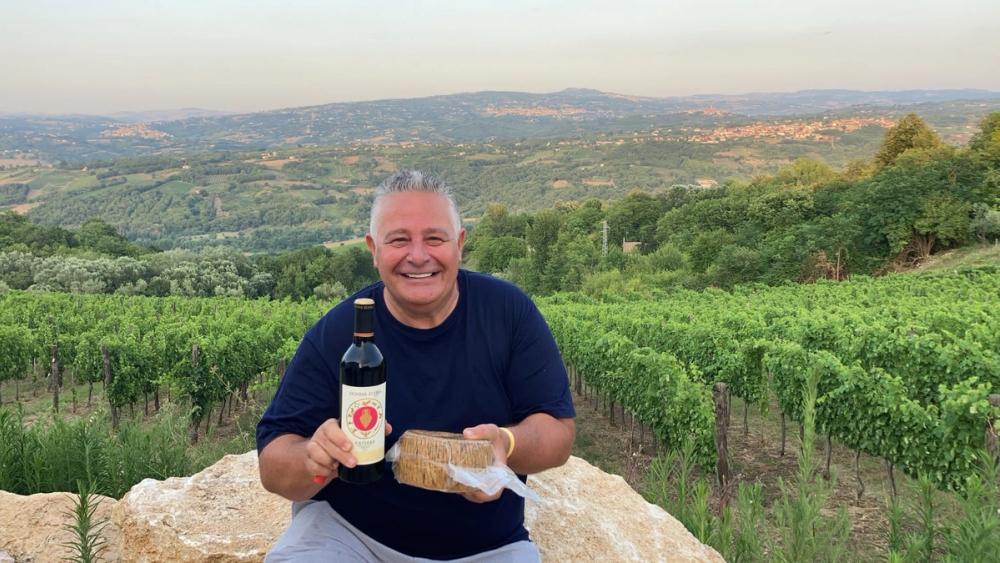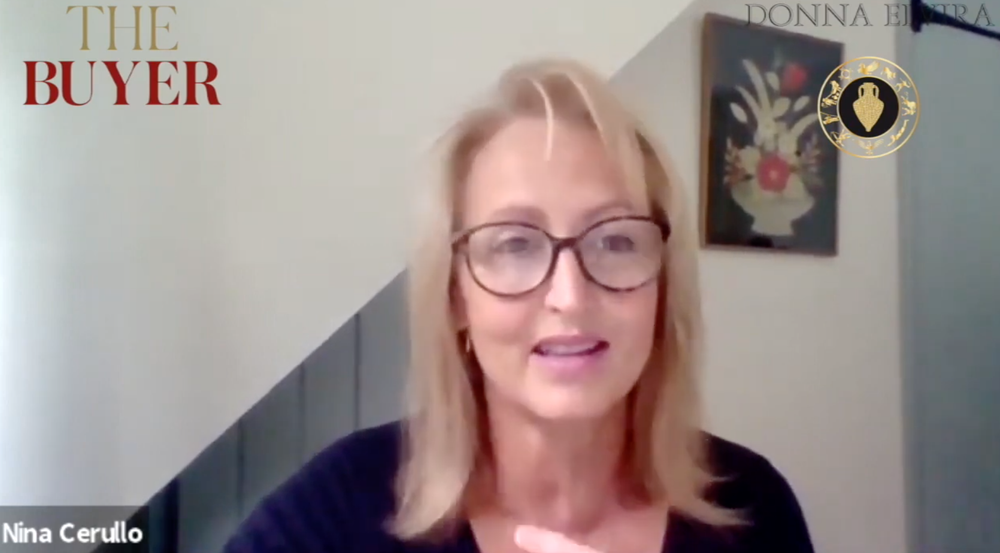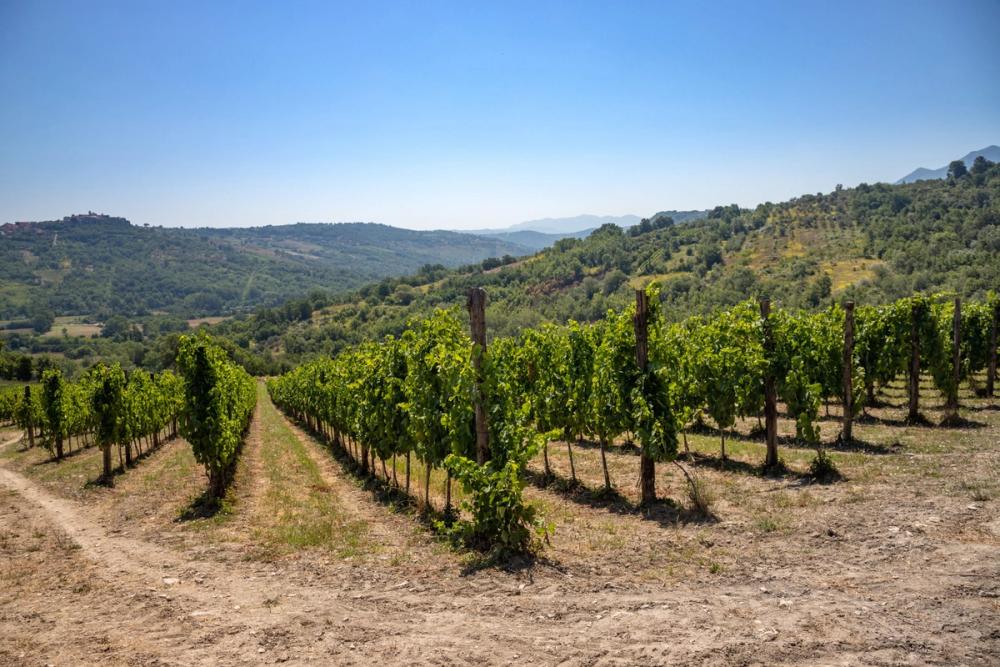Our thanks go to our buyers’ panel which included: Sarah Knowles MW, wine buyer, The Wine Society; Beth Willard, buying director, Winetraders; Shane McHugh, group wine buyer, Goodman Restaurants; Andrea Briccarello, business development manager, Jascots Wine Merchants; Daniel Grigg, managing director, Museum Wines. They were joined by Tony Fink, owner, Donna Elvira Wines and Nina Cerullo, wine educator, Donna Elvira Wines, to give a personal take on the wines of Campania.
(You can watch the full recording of the debate here)
When it comes to sourcing new, interesting wines that can work on restaurant wine lists the length and breadth of the country, Italy really is the country with endless possibilities for busy wine buyers. It’s not surprising so many top chefs often name Italy as their favourite wine country as its wines seem to be made more for the benefit of the kitchen and the dishes it can produce than for drinking just on their own.
Which makes a discussion about Campania, situated as much in a gastronomic heartland as it is an important winemaking region, such a fascinating proposal. For this, after all, is the home of pizza – Neapolitan style. Or spaghetti con vongole, risotto alla pescatore and Parmigiana melanzane, and so many other mainstays in Italian restaurants.
It was also a debate we had no trouble recruiting an elite panel of buyers for. There is clearly a genuine interest and thirst to find out more about what Campania can do in the premium UK wine market.
Overall Italian potential
Sarah Knowles MW, wine buyer at The Wine Society, quickly sets the scene by saying how well Italian wines have done over the last 18 months and how it has been a country that Wine Society members have been keen to explore in lockdown.
“We have seen a strong Italian growth in good value wine, under £15 retail, and we’re really focused on showing indigenous grape varieties from across Italy. We really focus on what we think is unique to Italy and what makes Italian wines special,” she says.
All of which is made possible thanks to the huge number of local varieties and the network of unique terroirs across the country, she adds.
The challenge for Winetraders as an Italian specialist, says Beth Willard, is to make sure it has as complete range as possible, from across all regions and price points. The demand is certainly there both at the value and premium end of the Italian category, she adds.
“We are also interested in covering indigenous varieties as well as more mainstream, understood varieties to offer the full gamut across all channels of the trade,” says Willard.
(Click here for Sarah Knowles MW, Beth Willard and Shane McHugh on overall demand for Italian wine)
Shane McHugh at Goodman, the premium steak restaurant group, says Italy as a whole is a country he is keen to explore and represent even more across its outlets. He describes its current Italian list as “watch this space” in terms of what he hopes to be able to bring to the range in the coming months. He says the restaurant group has always had its “bases covered in terms of classic [Italian] regions” but the opportunity now is in “finding excellent value stuff at regional level and a plethora of different varietals”.
He has also noticed a marked difference in customers’ tastes and preferences since re-opening this summer because of the rise in online retail during lockdown.
“People are looking for wines that are new and different. If people are putting that much care into doing a specified list say for Burgundy where it’s all different styles based on one variety, then why can’t we expand on a whole country like Italy which has a plethora of wines and styles and price points that will give great value to the guest,” he explains.
Andrea Briccarello at Jascots Wine Merchants says there has always been strong demand for Italian reds, but he feels there is still plenty of potential for the country’s white wines to shine more.
“What we are doing today and talking about Campania is a great occasion and a way to celebrate the white wines of Italy which are sometimes slightly forgotten and not recognised as much as the reds,” he says. “I think there is a quite a lot to do to break the wall of the classic Pinot Grigio. There is more out there to discover.”
Daniel Grigg says Museum Wines might be better known for its South African range, but Italy is very much “a personal passion” for him and where most of his personal reserves are from.
That said the wines from Campania are not as well represented in his range that arguably they should be, he admits.
Campania and Donna Elvira’s philosophy

Tony Fink has returned to his home in Campania to make premium wines true to the region
To help give us a local perspective and guide us through the opportunities that exist in Campania The Buyer also teamed up with Tony Fink, owner of Donna Elvira Wines, named after his mother who was born just five miles from where he now runs the family wine business that covers 10 hectares.
Fink may not sound like a born and bred local, but it is very much where he and his family are from and where his children were born. In fact his London accent is as strong as Bob Hoskins in his pomp, but his soul and influences all come from the Campania region.
Whilst he was largely brought up in the UK he spent a lot of time with his ancestors visiting and staying in the Campania area. Fink says he had long dreamt of returning and starting his own winery in the area, which the success of his UK construction business has allowed him to do.
“It’s a wonderful area that produces great wine but it’s also an undiscovered area that has never been marketed properly,” he says. “People are stuck on Pinot Grigio and Chianti and Barolo. But we have wonderful wines here like Falanghina, Greco, Fiano. It’s an area that has never been appreciated properly.”
It’s why 10 years ago he was happy to invest some of his own savings in setting up Donna Elvira and the chance to return to his “happy place” – which is actually the literal translation of Campania as “the happy, fruitful” region.
“I enjoy being in the vines and I aim to make small amounts of quality wine,” he adds.
To do so he is concentrating on using native grapes of Irpinia in Campania, which he thinks best demonstrates what the region can do. “My aim is to make people in the UK understand what a wonderful wine say Falanghina is instead of Pinot Grigio. Things like Aglianico that has never had the recognition that it deserves as a great wine.”
Fink now spends half of the year in the region with his family working with his winemakers to make up to 50,000 bottles of premium, crafted wines split across the classic local grape varieties; Fiano; Greco di Tufo; Falanghina; and Alglanico.
“That’s the size we want to be. We don’t want to get too big. We want to make something that we can be proud of.”
Fink is particularly keen to break into the UK and has just signed up with wholesale disruptor Propeller, the new business set up by Jamie Wynne-Griffiths, that acts more like an incubator for producers to find their feet in the UK specialist retail and premium on-trade.
Fink says: “We’ve been looking for the right route into this market for a little while now, and then a retailer suggested that we give Propeller a call. We spoke to Jamie Wynne-Griffiths on a Thursday afternoon, by the following Tuesday he and his team had tasted the range and given us a resounding thumbs up. We signed a contract the following day and confirmed their opening order. That’s pretty fast in anyone’s books. Our collaboration with Propeller over the next 12-18 months is all about getting our wines out into retail, to build the profile that they deserve and cement our position here so that we can then transition to a regular wholesaler with a large business book in place.”
Finding its place
(Click here for Donna Elvira’s Nina Cerullo on demand and interest in Campania & southern Italy)

Nina Cerullo, who consults for Donna Elvira Wines, has certainly fallen on her feet. Not only does she specialise in the region as part of her wine educator role – she is also married to a local from the Campania region.
“I have got to know Campania very well over the years so I completely understand when Tony talks about what a happy place it is,” she says.
She is also keen to point out just what an impact that Tony Fink has had on the area. Not only has he built his own wine business from scratch, but he has done so with a commitment to also supporting the local community.
“One of his personal obligations was to invest in the local area and to help the local economy and to get the local people working on the land,” she says. “It’s really important that people like Tony have come in become it needs the investment. Campania is not a wealthy part of Italy.”
Tourism is starting to make a big impact on the area, she adds, as more people travel inland and not just come to southern Italy to visit the Amalfi coast. All of which has introduced Campania’s food and wine to a much wider audience which can not be under estimated.
Cerullo says she has seen a marked difference in the interest there now is in southern Italy and its wines. When she first started doing masterclasses for the trade on Campania, people knew very little about it. Now those same masterclasses are the ones that sell out first, she says. “They are always full of sommeliers. And it makes sense as the wines are very food focused. The whites especially.”
In fact she believes the white grape varieties from Campania “are the most exciting in Italy certainly for food matching. I don’t think there is anything that compares”.
They are also grape varieties that date back to the Roman times when people would regularly feast on Fiano, Greco and Falanghina.
(Click here for Jascots’ Andrea Briccarello and Goodman’s Shane McHugh on potential for Campania wines)
Briccarello could understand why her masterclasses were full of sommeliers as he too had an extensive list of Campania and Sicilian wines during his time as a sommelier, most recently at Galvins. Jascots is also now having great success with its Campania wines and he thinks it is the combination of native varieties, but also the unique characteristics of volcanic soils that give them the edge.
“They are wines that have been extremely successful within the sommelier crowd. They are wines that are very unique and so food friendly. You open a bottle of Falanghina, Fiano, Greco, Fiano and you just want to have shellfish. We have done very well with them.”
He also sees them as wines that are “extremely useful” for sommeliers to use by the glass or in tasting menus. “There is a fantastic opportunity to have these wines and to sell these wines.”
Shane McHugh says he has come across wines from Campania at each stage of his career from casual to fine dining – be it working as part of an all Italian sommelier team or choosing wines for tasting menus.
“We were changing tasting menus once a week and pretty much wines from Campania I was using every week because they are such a phenomenal tool to have in your back pocket when you are trying to get food and wine pairing together,” he says.
Now at Goodman he has had a “phenomenal response” to the Campania wines he has introduced recently. “So maybe we should take it to the next level and see where it goes.”
(Click here for Sarah Knowles MW from the Wine Society on the great potential of wines from Campania)
Knowles completely agrees with Cerullo that the “food culture is something else” in Campania and is a region where “wine and food so intricately linked”.
From a wine perspective she also echoes Cerullo’s call for greater investment, particularly in terms of the quality of some of the vines that need more “care and tenderness”.
“Those that have received it are where the vines are thriving are producing some fantastic, quality wines and really interesting styles. So it is a region that is worth definitely getting off just the coastal section and into the vineyards and countryside,” she adds.
The Wine Society is now working with around six producers from Campania, including an own label Falanghina which is doing so it accounts for around half the volume it does for Pinot Grigio. “For it be half the volume of Pinot Grigio is a great success as it is quite a tricky grape variety to start introducing. Putting it under own label for us was a way to do that.”
Willard says Winetraders is also woking in Campania and is bringing wines from more premium producers where the volumes might be lower due to the higher price points.
She says that whilst on the one hand varieties such as Fiano and Falanghina are not widely known “what’s great about these wines is that consumers will keep going back to them once they have tried them”.
She adds: “Even though they are niche and quirky as grapes the actual profile of the wines are very consumer friendly, approachable and are really fruity, fresh and salty.
“Sometimes when we are looking at indigenous varieties in the trade we get excited about weird and wonderful things, but they are hard to approach [for consumers] theses wines from Campania are super friendly and really easy for consumers to understand.”
Her advice for the region as a whole is to look at what a region like Sud de France has been able to do in linking its tourism, wine and food and really building that up. Which is why she appreciated the marketing materials she was sent ahead of the Campania debate that looked to offer similar insights into the region.
“There is a real opportunity there to take a more holistic view rather than just focusing down on the wines. Especially when we take the end consumer into consideration.” She adds: “Its quite aspirational looking at some of the pictures.”
Daniel Grigg at Museum Wines loves how “versatile” the wines from Campania are, particularly the white varieties that are such classic food wines. “That’s what stands out for me,” he says. “I think there is room for wines like this in our range.”
Elevating its profile

The higher altitude allows Donna Elvira to keep the freshness in its wines
The panel discussed Campania’s positioning in the Italian wine category as a premium area and perhaps the need to do more work to explain and promote just why its wines, particularly from the coveted DOCG area where Donna Elvira comes from, deserve their higher price point.
Willard at Winetraders says the issue Donna Elvira may have with its style of Fiano, for example, is there are cheaper alternative Fianos from southern Italy available and that it is its DOCG status that makes it so different.
“That does pose a little bit of a problem,” she adds. “It’s getting people to understand that this is of a different quality. It might be more of a challenge [for Fiano] than with the other varieties which are more associated with coming from that region,” she explains.
Cerullo agrees and thinks more work needs to be done, potentially by the local Consorzio, to “get the message out there that the quality of these DOCG wines are different from those grown in other areas”.
Knowles believes that extra layer of knowledge and promotion would really help “anchor” these DOCG white varieties in coming from Campania. Particularly as she agrees with Willard that buyers can pick up alternative cheaper Fianos from elsewhere in southern Italy. “The DOCG level certainly helps, but I think more would could be done,” she adds, particularly with a more subtle grape variety such as Fiano that does not “hit you over the head” and needs more explanation.
If she is looking to share that message with Wine Society members then it would be very much about talking about the wine and the producer and their unique story and why the wine is at a higher level than another of the same grape variety. “The good thing for Fiano is there could be a stepping stone into it. People like to try an inexpensive wine of a new variety first, to explore and then they are happy to work their way up to wines that offer the same level of value but at a higher price point.”
That difference in quality, though, stresses Fink is very well understood by Italians who normally don’t like spending a great deal on their wine, but are quite happy to pay more for DOCG Campania wines. “They are happy paying that little bit extra if they know it is from Campania,” he says.
Briccarello likens the issue to mozzarella. If you taste buffalo mozzarella from Campania then it is “completely different”. “It’s the same, say, with proper Fiano, people will recognise it and buy it again. It is important to put the right Fianos in front of customers.”
(Click here for Daniel Grigg of Museum Wines on how Campania is a hand sell for independent merchants)
Grigg says that in the six years he has been running Museum Wines he can’t remember someone coming in and asking him for a Greco, Fiano or Falanghina from Campania, but that does not mean they would not do so in the future with a bit more promotion and profile.
“It needs to get its Grecos, Fianos or Falanghinas as associated with Campania as Sauvignon Blanc is with Marlborough in New Zealand,” he adds. “So if someone looks at a wine list and they see one of those varieties from somewhere else then they don’t want it.”
He likens it to the recent success he has had selling Trebbiano from Lugana at £23 in his own store and to his wholesale pub and restaurant customers and has had no push back at all.
Which is why he thinks there is great potential for the Donna Elvira wines – particularly around the £19.99 mark – in independent merchants where they can hand sell them to a “captive audience”.
“I think they’re great. No one is going to push those wines away. They are definitely crowd pleasing.”
- If you would like to know more about Donna Elvira wines you can go to its website here.
- To talk to its new UK distributor or request samples you can go to Propeller website or contact Corinne O’Connor at Corinne@propeller.wine or calling 01925 315539.






























